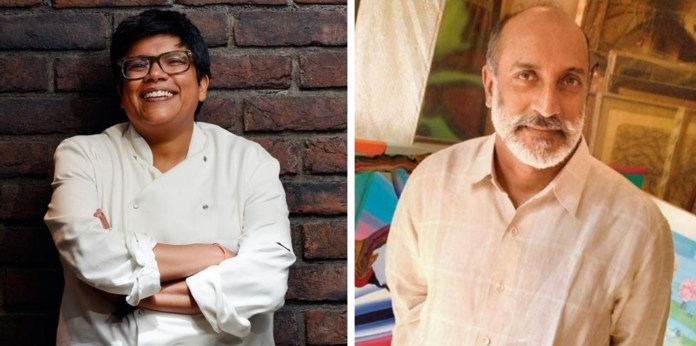Our country achieved a significant milestone on the 6th of September, 2018 when the Supreme Court of India dismissed the obsolete section 377 drafted by the British legislation back in the 1860s that criminalised gay sex between two complying adults. And every year June is now celebrated as the gay pride month. So we rounded up a list of some of the key people from the LGBTQ+ community in the country who broke the norm and stood up for their rights.
1. Sunil Mehra and Navtej Johar

The Delhi based couple Sunil Mehra and Navtej Johar spent over two decades together. They have fought for equal rights for homosexual individuals in India. They decided to come out publicly a few years ago by moving the supreme court to scrap section 377.
Mehra, a former journalist and Johar, a classical dancer, yoga instructor, and choreographer, managed to live together for over 20 years with the support of their friends and family. However, they did experience an initial lack of acceptance, and they felt that section 377 infringed the right to life and personal liberty assured by the Constitution. This is why this couple decided to petition the court to strike down section 377 and made history with their move.
2. Ritu Dalmia

The chef and restaurateur, based out of Delhi, identifies herself as part of the LGBTQ community. She was among a group of five individuals that petitioned the supreme court in 2016 to scrap section 377. When she was 23, Ritu fell in love with another woman and decided to break the news to her wealthy, conservative family. While she faced a fair amount of resistance and received plenty of hate messages, there was also a lot of support. Over the years, Dalmia has fought for freedom from the misery and blackmail that homosexuals in India are subjected to.
She filed a petition against article 377 after the Supreme Court reserved the Delhi High Court’s judgement on the same, reinstating the law that criminalised adult consensual same-sex relations.
3. Aditya Bandhopadyay

Aditya Bandopadhyay came out as gay when he was all of 19, that too in the early 1990s. One of his friends had committed suicide after the Kolkata police caught him with another man and threatened to tell his family. That is when he made up his mind that he doesn’t want to hide his identity. As a young lawyer, Aditya helped in drafting a challenge to Section 377 in 2001.
Eight years later, a court in New Delhi struck down the law, but the Supreme Court brought it back in 2013, ruling that it should be a legislative matter because it concerns only a tiny section of the country’s population. But he did not give up and played a leading role in the movement to Decriminalise Homosexuality in India.
4. Keshav Suri

Keshav Suri, the executive director of a chain of luxury hotels founded by his father, was the lead plaintiff in the case before the Supreme Court to decriminalise homosexuality. Keshav, in his petition, said he was always living under the fear of false prosecution.
In 2011, Keshav opened a nightclub called Kitty Su at The Lalit Hotel in New Delhi, where the weekly parties featuring drag performers and queer singers and dancers draws at least 400 people. He hired transgender people to send a message that no law prohibits people from accepting others’ sexuality. Keshav and his longtime partner Cyril Feuillebois got married in Paris last year in June.
5. Akkai Padmashali

Bengaluru-based transgender activist Padmashali faced the monstrosity of section 377 in her early 20s. Several years of begging, prostitution, and fighting abusers had left Padmashali in agony. Even though India legally recognised transgender people as gender identity, their sexual orientation put them under the purview of section 377.
Over the years, Padmashali has become y involved in protecting the rights of the transgenders. Padmashali has an honorary doctorate and has received the Kannada Rajyotsava award, a civilian honour instituted by the southern Indian state of Karnataka. However, Padmashali, along with Uma Umesh, another Bangalore based transgender activist, and journalism student Suma, filed the petition on behalf of the transgender community challenging section 377.
6. Ayesha Kapur

Growing up in New Delhi during the 1980s, Ayesha knew of no gay women and had no reference points from Bollywood movies that could help her understand her sexuality. However, about three decades later, she became a member of the first group of gay petitioners to challenge the law.
A double major from Clark University Massachusetts, Ayesha had earlier quit the post of the business head at an e-commerce company over fears that her sexual orientation would be discovered. The businesswoman who currently works in the food and beverage industry now openly declares her sexuality.
7. Aman Nath

An Indian writer, hotelier and architectural restorer, Aman Nath is also a warrior for Gay rights. Nath was in a 23-year-long relationship with his business partner Francis, till his death in 2014. He now lives with his adopted daughter named Aadya Nath. While Nath himself did not face any trouble, however, he decided to file the petition against section 377. He felt that the country needed to be shaken and to be awoken to acceptance without any judgement or discrimination!




